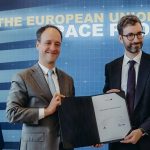SES and Intelsat, both headquartered in Luxembourg, are major players in the global satellite communications sector and operate geostationary Earth orbit (GEO) satellite networks. While SES is firmly established in Europe, Intelsat’s primary operations and administrative base are in the United States. Both companies deliver satellite capacity to clients in various industries. These include “one-way” services for broadcasters in the media sector and “two-way” capacity for sectors such as aviation, maritime, and government, either through third-party providers or directly.
The merger, according to the companies, is intended to enhance service coverage and network resilience, helping them better compete with the growing presence of low Earth orbit (LEO) satellite operators.
The Commission examined the merger’s impact across global and EEA markets for both “one-way” and “two-way” satellite capacity, as well as potential downstream effects where the companies also provide satellite services directly. Its investigation found that sufficient competition would remain post-merger, with viable alternatives in the form of other GEO satellite providers and terrestrial technologies like fibre optics. In the “two-way” market, the rise of LEO operators was also identified as a significant source of competitive pressure.
Importantly, the Commission determined that the newly merged entity would not be in a position to harm downstream rivals by limiting access to satellite capacity.
As a result, the Commission approved the acquisition without imposing any conditions, affirming that the merger will not hinder competition within the EEA.
 The European Commission has given unconditional approval to the proposed acquisition of Intelsat Holdings S.à r.l. by SES S.A., under the EU Merger Regulation. Following a detailed assessment, the Commission concluded that the deal does not pose any competition concerns within the European Economic Area (EEA).
The European Commission has given unconditional approval to the proposed acquisition of Intelsat Holdings S.à r.l. by SES S.A., under the EU Merger Regulation. Following a detailed assessment, the Commission concluded that the deal does not pose any competition concerns within the European Economic Area (EEA).











































































